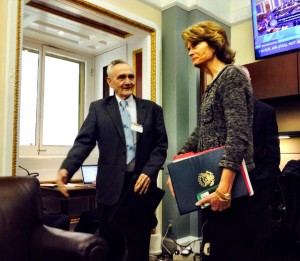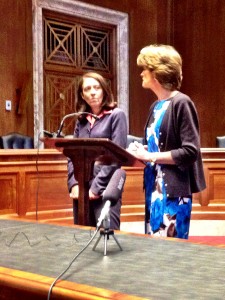
In all, five candidates are on the ballot challenging U.S. Sen. Lisa Murkowski. If one of them wins, the victor would get her Senate seat, but not her chairmanship of the Energy Committee. So what does that matter to you?
As chairman of the Energy and Natural Resources Committee, Murkowski has brokered water disputes in the arid West, and she’s been in the middle of other rather non-Alaskan issues, too: The Puerto Rican debt crisis, advances in nuclear power, and auto manufacturing.
Murkowski says she takes seriously her role in helping to create energy and resource policy for the nation.
“If you take a very, very strictly parochial view of energy and say ‘the only energy sources that matter are what we have in Alaska,’ it’s a pretty short-sighted vision,” she said.
But let’s say you are a strictly parochial Alaskan. What does her chairmanship bring YOU? Well, the energy bill that she got through the Senate is peppered with items she’s hoping will benefit Alaska, like a pipeline right of way, authority for hydropower projects and promotion of electric microgrids of the type pioneered in rural Alaska.

A House-Senate conference committee is still working on that bill, but it could become law. The senator has also made a top priority of a land trade bill that would allow the Mental Health Land Trust to harvest Tongass timber and avoid unpopular logging near Southeast Alaska cities. Aside from legislation, Murkowski says the chairmanship lets her decide what matters deserve hearings.
“These are opportunities for very specific Alaska-related issues to come front and center,” she said.
Since assuming the chairmanship in 2015, she’s held hearings on Arctic oil development and on the forestry challenges in the Tongass. Her committee has heard a lot about an Alaska community that would like to build a road through the Izembek National Wildlife Refuge. A good number of United States senators are now well aware of tiny King Cove and its limited access to emergency medical care. Still, there is no road. Interior Secretary Sally Jewell is still blocking it.
It takes seniority to become a chairman. Murkowski was in office 12 years before she got her gavel. Independent challenger Margaret Stock, said on APRN’s “Talk of Alaska” recently that Murkowski still hasn’t been able to get much done for Alaska.
“I’m a much harder worker and I think I can get things done without seniority that Sen. Murkowski’s not been able to accomplish,” she said.
Libertarian Joe Miller says Murkowski has been unable to achieve big resources development goals – like opening the Arctic National Wildlife Refuge to oil drilling, because she, like her predecessors in Congress, is too focused on getting money out of the federal government.

“I mean, we have got to have somebody who is out there focusing their efforts, their political seniority and their leverage on opening the resource base, rather than going the direction of the last several decades, which is a shrinking federal purse,” Miller said.
That’s one theory: If you spend political capital to get federal money, you have less to achieve development goals.
Drue Pearce, on the other hand, says Murkowski uses her chairmanship to build up more political capital. Pearce is an energy lobbyist who used to be president of the state Senate, and she’s contributed to Murkowski’s re-election campaign. She says Murkowski accomplishes a lot by setting a cooperative tone. Unlike other Republican chairmen, Murkowski includes a lot of Democratic priorities in her bills. In the arithmetic of Capitol Hill, Pearce says that opens more opportunities for Murkowski to press home-state issues.
“So that’s very important for us, because it helps her take the things that are Alaskan specific and have them poised and ready to go into bills as she’s making deals with minority,” she said.
Also, Pearce says, as chairman, Murkowski has more aides to work on Alaska issues. Murkowski has 22 committee staffers, and many of them have Alaska roots.
Another prerogative of the chairman is to publicly confront administration officials. At budget time, Murkowski typically gets two shots at the same top official, because she also chairs the Appropriations subcommittee that funds the Interior Department, the Forest Service and the EPA. Murkowski often uses these confrontations to argue that Alaska has special circumstances and shouldn’t face the same regulations as other states.
“We find ourselves often talking about the uniqueness of Alaska,” said EPA administrator Gina McCarthy at one of Murkowski’s hearings last year, defending the administration’s Clean Power Plan. McCarthy later announced Alaska, unlike other states, does not have to comply with mandates to lower greenhouse-gas emissions from power plants, due to its unique conditions.
Polls show the Democrats could win control of the U.S. Senate in this election. If that happens, Murkowski won’t be chairman of any committee. She won’t enjoy the staff or prerogatives assigned to the top-ranking minority member on the energy committee, either, due to Republican limits on the terms of ranking members. But if Republicans retain the majority, or whenever they regain it, she can serve four more years as Energy Committee chair, and her chairmanship of the appropriations subcommittee has no time limit.-
Liz Ruskin is the Washington, D.C., correspondent at Alaska Public Media. Reach her at lruskin@alaskapublic.org. Read more about Liz here.





